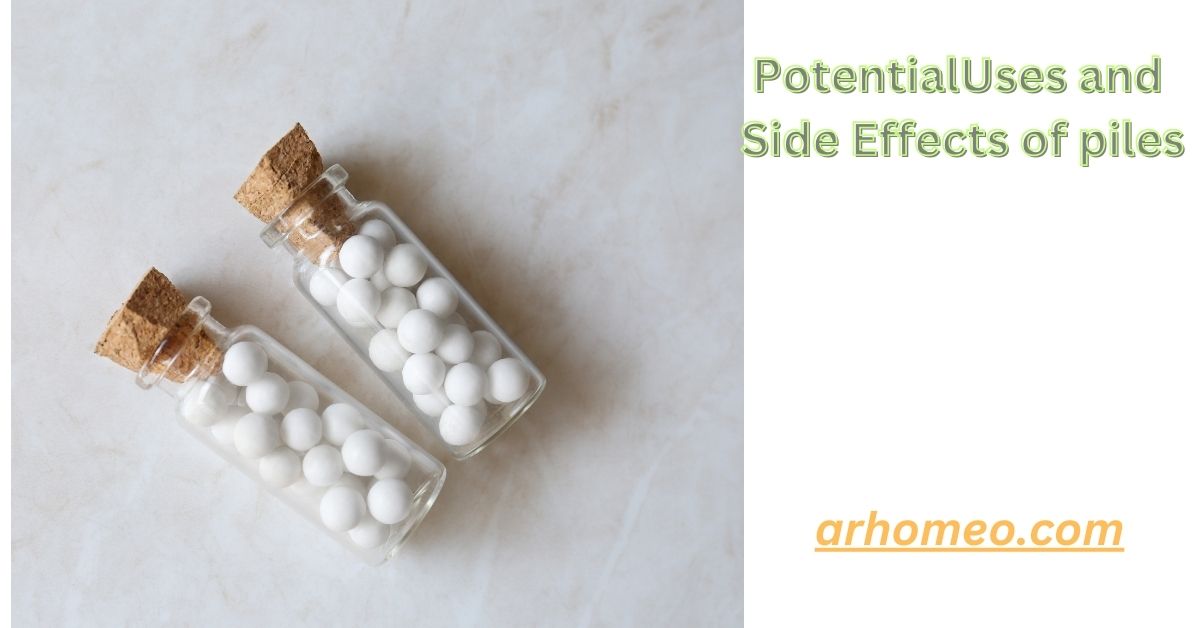Side Effects of piles:Piles, or hemorrhoids, are swollen blood vessels in the rectum or anus, causing discomfort and pain. Common side effects include itching, irritation, and bleeding during bowel movements. In severe cases, piles can lead to significant pain, swelling, and the formation of hard lumps around the anus. Prolonged straining may worsen the condition, causing further complications like anal fissures or infections. Untreated piles can result in chronic discomfort and may require surgical intervention if symptoms persist or worsen. Maintaining a healthy diet and proper hygiene can help manage and prevent piles.
Is piles dangerous
Piles, or hemorrhoids, are generally not life-threatening, but they can cause significant discomfort and impact daily life. While mild cases may resolve with over-the-counter treatments and lifestyle changes, severe or untreated piles can lead to complications like excessive bleeding, anemia, or blood clots. In rare cases, severe piles may cause tissue strangulation, requiring urgent medical attention. Regular medical evaluation and prompt treatment can prevent piles from becoming a serious health issue.
What are Piles?
Piles, also known as hemorrhoids, are swollen and inflamed blood vessels in the rectum and anus. They can develop internally, inside the rectum, or externally, around the anal opening. Piles are often caused by increased pressure in the lower rectum due to straining during bowel movements, chronic constipation, or prolonged sitting. Symptoms include itching, discomfort, pain, and bleeding during bowel movements. While usually not dangerous, piles can cause significant discomfort and may require treatment to alleviate symptoms.
Symptoms
The symptoms of piles, or hemorrhoids, often begin with a subtle discomfort around the anal area, sometimes accompanied by a mild itch that gradually intensifies. Internal piles might cause bright red blood to appear after a bowel movement, while external piles can result in painful, swollen lumps near the anus. You may also experience a persistent feeling of incomplete bowel evacuation or even mucus discharge. In some cases, the discomfort escalates to sharp pain, especially during or after defecation. Recognizing and addressing these symptoms early can prevent complications and improve overall well-being.
There are 4 grades of haemorrhoids (based on severity)
Hemorrhoids are classified into four grades based on their severity. Grade I hemorrhoids are internal and may bleed but do not prolapse. Grade II hemorrhoids protrude during bowel movements but retract on their own. Grade III hemorrhoids prolapse and require manual repositioning. Finally, Grade IV hemorrhoids remain prolapsed and cannot be pushed back, often leading to persistent discomfort and potential complications like thrombosis. Understanding these grades helps in determining the appropriate treatment and managing symptoms effectively.
Physical Examination
A physical examination for hemorrhoids involves a thorough inspection of the anal area to assess the presence and severity of the condition. The doctor may use a gloved finger to perform a digital rectal exam, checking for lumps, tenderness, or abnormalities. In some cases, an anoscope—a small, lighted instrument—is used to examine the interior of the rectum. This examination helps determine the grade of hemorrhoids and guides the appropriate treatment plan, ensuring effective symptom management.
Natural Products with Potential Effects on Hemorrhoids
Several natural products have shown potential in alleviating the symptoms of hemorrhoids. Aloe vera, known for its anti-inflammatory properties, can soothe irritation when applied topically. Witch hazel, another popular remedy, acts as an astringent, reducing swelling and providing relief from itching and discomfort. Consuming fiber-rich foods like psyllium husk can ease bowel movements, preventing strain that exacerbates hemorrhoids. Additionally, applying coconut oil may help moisturize and reduce irritation. Sitz baths infused with Epsom salts can also be effective in reducing pain and inflammation. While these natural remedies can offer relief, it’s essential to consult a healthcare professional for proper diagnosis and treatment.
Understanding Piles and Fissures
Piles and fissures are distinct yet often confused conditions affecting the anal region. Piles, or hemorrhoids, involve swollen blood vessels in the rectum or anus, leading to discomfort, itching, and bleeding. Fissures, on the other hand, are small tears in the lining of the anus, typically causing sharp pain during bowel movements and bright red bleeding. While both conditions result from strain during defecation, their treatment approaches differ, making accurate diagnosis essential for effective management.
Traditional Treatment Approaches
Traditional treatment approaches for hemorrhoids focus on alleviating symptoms and improving comfort through various methods. Initially, patients are advised to make dietary changes, such as increasing fiber intake to soften stools and reduce straining. Warm sitz baths, which involve soaking the anal area in warm water, can provide relief from pain and inflammation. Over-the-counter topical creams and ointments containing ingredients like witch hazel or hydrocortisone are commonly used to ease itching and swelling. Additionally, lifestyle modifications, including regular exercise and avoiding prolonged sitting, help prevent further irritation. In persistent cases, traditional remedies may be combined with medical interventions like rubber band ligation or surgical procedures for more severe hemorrhoids.
Homoeopathy as a Non-Invasive Solution
Homeopathy offers a non-invasive approach to managing hemorrhoids by using highly diluted substances tailored to individual symptoms. Remedies such as Aesculus hippocastanum can address pain and swelling, while Hamamelis virginiana is used for its anti-inflammatory properties. Ratanhia may help with the burning sensation, and Sulphur can assist with itching. Homeopathic treatment focuses on stimulating the body’s natural healing processes, aiming to reduce symptoms without invasive procedures. However, while many find relief with homeopathy, it’s essential to consult a healthcare professional for a comprehensive treatment plan that considers both conventional and alternative therapies.
Benefits of Homoeopathic Treatment for Piles and Fissures
Homeopathic treatment for piles and fissures offers several potential benefits. It provides a personalized approach, addressing symptoms and underlying causes based on individual patient profiles. Remedies like Aesculus and Hamamelis can help reduce inflammation and pain without the side effects commonly associated with conventional medications. Homeopathy also promotes overall well-being by enhancing the body’s natural healing processes and reducing chronic symptoms. Additionally, it is non-invasive and can be used alongside other treatments to provide a holistic approach to managing hemorrhoids and anal fissures. Consulting a qualified homeopath ensures a tailored treatment plan that aligns with each patient’s specific needs.
What medicine can cure piles fast?
For quick relief from piles, several medications are commonly used. Topical treatments, such as creams containing hydrocortisone or witch hazel, can reduce inflammation, itching, and discomfort. Over-the-counter ointments with ingredients like lidocaine or pramoxine provide temporary pain relief. For more persistent cases, oral pain relievers such as acetaminophen or ibuprofen can be effective. In severe cases, prescription medications like topical nitroglycerin or corticosteroids may be recommended by a healthcare provider. However, these treatments address symptoms rather than cure piles. To manage and potentially resolve the condition, lifestyle changes and dietary adjustments are also crucial, alongside medical treatment.
Tips for Choosing a Homoeopathic Practitioner
When choosing a homeopathic practitioner, ensure they are qualified and licensed, with a solid background in homeopathy. Look for practitioners with good reviews or recommendations from trusted sources. It’s important that they take a detailed personal history and tailor treatments to your specific symptoms. Verify their experience with conditions similar to yours and confirm they use proven remedies. A good practitioner should also be open to collaborating with other healthcare providers if needed, ensuring comprehensive care for your condition.
FAQ
- What is homeopathy?
Homeopathy is a holistic medical system that uses highly diluted substances to stimulate the body’s natural healing processes. Remedies are selected based on individual symptoms and overall health. - How does homeopathy help with hemorrhoids?
Homeopathic treatments aim to reduce inflammation, pain, and discomfort associated with hemorrhoids. Remedies like Aesculus and Hamamelis are commonly used to address symptoms and promote healing. - Are homeopathic treatments effective for hemorrhoids?
Effectiveness can vary from person to person. Many find relief from symptoms with homeopathy, but it is often best used in conjunction with lifestyle changes and conventional treatments. - How long does it take to see results?
Results can vary depending on the severity of the condition and the individual’s response to treatment. Some may experience relief within a few weeks, while others might take longer. - Are there any side effects of homeopathic treatments?
Homeopathic remedies are generally considered safe due to their highly diluted nature. However, it’s essential to consult with a qualified practitioner to ensure the remedy is appropriate for your condition. - How do I choose a qualified homeopathic practitioner?
Look for practitioners with proper qualifications and licensing in homeopathy. Seek recommendations, check reviews, and ensure they conduct a thorough assessment of your symptoms. - Can homeopathy replace conventional treatments?
Homeopathy can complement conventional treatments but should not necessarily replace them, especially for severe cases. Consult with your healthcare provider to develop a comprehensive treatment plan.
Conclusion
In conclusion, homeopathy offers a personalized and non-invasive approach to managing hemorrhoids and fissures, aiming to alleviate symptoms like pain, itching, and inflammation. While remedies such as Aesculus and Hamamelis can provide relief and support the body’s natural healing processes, their effectiveness can vary. It’s essential to consult a qualified homeopathic practitioner to ensure an appropriate and tailored treatment plan. Combining homeopathy with lifestyle changes, such as dietary adjustments and proper hygiene, can enhance overall treatment outcomes. Always consider integrating conventional medical advice for a well-rounded approach to managing and potentially resolving hemorrhoids.

